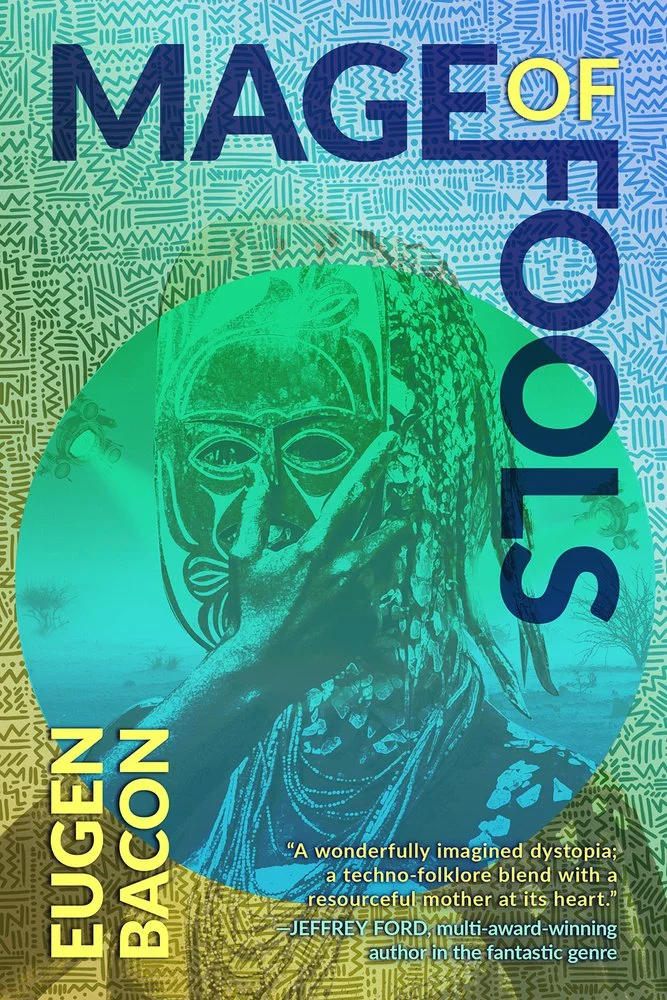Mage of Fools by Eugen Bacon
Publisher – Meerkat Press
Published – Out Now
Price – £14.95 paperback £6.12 Kindle eBook
In the dystopian world of Mafinga, Jasmin must contend with a dictator's sorcerer to cleanse the socialist state of its deadly pollution. Mafinga's malevolent king dislikes books and, together with his sorcerer Atari, has collapsed the environment to almost uninhabitable. The sun has killed all the able men, including Jasmin's husband Godi. But Jasmin has Godi's secret story machine that tells of a better world, far different from the wastelands of Mafinga. Jasmin's crime for possessing the machine and its forbidden literature filled with subversive text is punishable by death. Fate grants a cruel reprieve in the service of a childless queen who claims Jasmin's children as her own. Jasmin is powerless -- until she discovers secrets behind the king and his sorcerer.
Dystopias are often associated with the future. That is certain trends continue we head into the land of nightmares. But we should remember there are always real events that may inspire. In Eugen Bacon’s thought-provoking Mage of Fools, we have an SF dystopian tale exploring the rise and fall of a country as a malicious powerful alien inserts themselves into one country and slowly it turns into a place that has extraordinarily little chance of freedom…or so its rulers like to think.
In Mafinga when the old King died, and his son took over the country did not expect it to be plunged into an industrial dystopia. A powerful alien named Atari has made themselves the hidden power in the palace. He is forcing the country to move to dangerous industry, mining uranium and vast amounts of the population have perished through illness or crackdowns on democracy. Jasmine has already lost her talented husband and now finds herself working at the palace where there may finally be a chance for freedom.
Bacon eloquently creates a story that explores how a country can be corrupted. How can an entire population be freed? Plus, a reminder that no revolution is ever itself likely to be all peaceful. It was delivered in an intimate play like fashion as we see the fall and rise of Mafinga focused on a few key characters. But it also can be read as a subtle commentary on how countries themselves can be corrupted by external powers focused on using a country for its resources at the expense of its people. That Mafinga’s resources still get sold to and happily by other countries who seem not interested in Mafinga’s plight feels quite true. Stories and literature are the tools that give people the ability to dream of a different life and hence outlawed but we see how they push Jasmine into supporting a chance for change.
With the key character of Jasmine, we have a woman who has lost her husband and has been working in a very dangerous factory where the guards often sadistically abuse and can kill without fear of reprimand. The news has gone; anyone deemed a radical will be publicly and literally pulverized. It is a dark and oppressive atmosphere, but fragments of resistance can be found. Jasmine, through an unexpected turn of events finds herself working in the palace and finds the King’s young wife Sheeba a potential ally and then collaborating with other hidden members of the resistance is a dangerous battle to find freedom. It is less an action-adventure epic and more a reflection on how there will be those that choose to take the choice of power over others, those who become the oppressed and some who try and get the right result. What I found most interesting was Bacon is prepared to show what happens next. Certain characters who have been supporting the regime will be judged and executed and Bacon makes us look at what happens in all its unpleasantness. Is this justice or revenge? It is a disquieting note that the next version of Mafinga may still have trouble in store for itself.
I really enjoyed this book. The exploration of how and why a country can become corrupt is subtle but thought provoking it does though suddenly sped up in its final chapters and a few more chapters to explore the revolution and aftermath I would have happily accepted. What it was though was a hugely enjoyable read – well worth a look.
